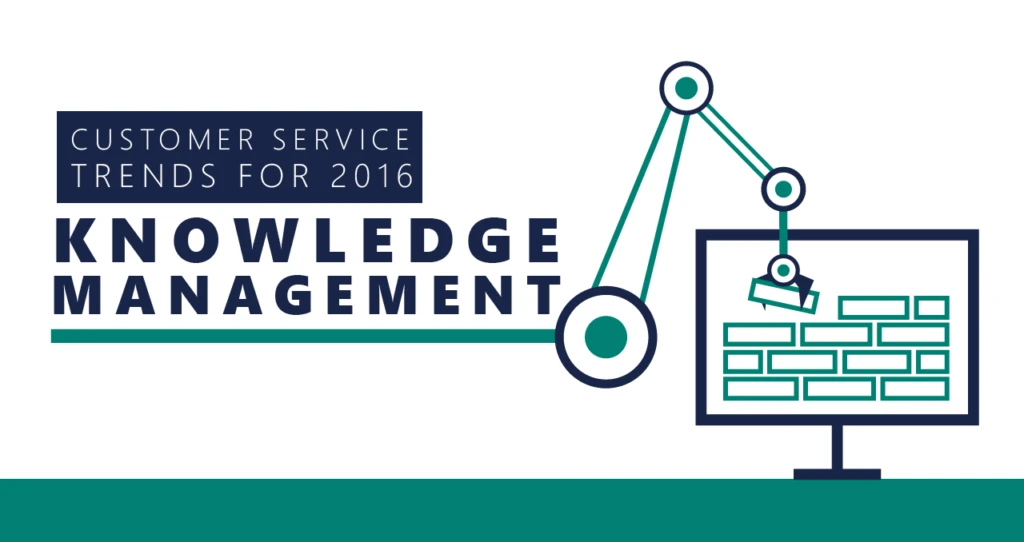
Knowledge Management in an Omni-channel World
Too many companies force their customer service reps to reinvent the wheel with every customer interaction. If a clear, standardized solution is not readily available with minimal keystrokes, these employees are wasting precious time (and precious money) trying to do their jobs—and they risk losing customer loyalty while they’re at it.
Tricia Morris, Senior Product Marketing Manager for Parature, from Microsoft, believes that needs to change, and this is the year it can happen. In the eBook 10 Customer Service Trends to Watch in 2016, she flags knowledge as a top trend: “The availability and accessibility of knowledge (both internally and externally) is what I believe will have a significant impact in improving customer service in 2016 and beyond.”
What is knowledge management, anyway?
Knowledge management is a process developed for the efficient handling of information and resources within an organization. Gartner has defined true knowledge management as a process that “promotes a collaborative and integrative approach to the creation, capture, organization, access, and use of information assets, including the tacit, uncaptured knowledge of people.”
Sounds like a great thing, right? But even though 98 percent of US consumers say getting a satisfactory answer or being connected to someone knowledgeable are important prerequisites to great customer experiences, more than half of companies do not offer an agent-facing knowledge management solution. There’s clearly a disconnect.
Find out what else customer service insiders say is hot in 2016
Knowledge is power
Every day, a typical knowledge worker spends 36 percent of her day looking for information. And she only finds the information required to do her job about 56 percent of the time. Imagine the efficiency gains if she cut her search time in half, or found what she was looking for every time instead of half the time.
It’s not just your employees who need access to the right information. Self-service portals and FAQs allow consumers to get the answers they need right away, any time of day, anywhere they have an Internet connection. That’s valuable for any interaction, but in a situation where a customer is unhappy or frustrated, quick access to the right answer can make the overall experience much more positive.
And customers really do crave a fast response. “Fast response to inquiries or complaints” is the most important aspect of an ideal customer experience, according to the 2,000+ global customers who were surveyed in a 2014 Economist Intelligence Unit report.
“Assisted service agents are doomed in customer satisfaction and first contact resolution ratings if they can’t surface and deliver answers and information quickly,” Morris warns. “And the expectations for ‘quickly’ only continue to grow.”
Part of the problem is that businesses don’t consolidate knowledge. To find information, 60 percent of employees have to search across four or more systems. Knowledge must be available and easily accessible, or it may as well not be there at all.
Better knowledge management means better customer service
Quick access to accurate knowledge isn’t just good for customer satisfaction scores. Digital knowledge systems save on operating costs. They’re paperless, living documents that can be updated at any time, which means it’s easy for companies to provide up-to-date information on products, problems, or solutions.
Are a large number of reps or users conducting searches on a particular topic? Are they finding the information they need? Intelligent knowledge management systems allow companies to identify skill gaps in the workforce and information gaps in support manuals or other self-service offerings. This data makes it possible to refine training for employees or modify self-service materials to better meet the needs of the users.
The best knowledge management solutions also make it possible to collect the best answers and resources, even if they’re coming from outside an organization. With Microsoft Dynamics CRM 2016, you can quickly turn customer feedback and issues into knowledge articles. The interactive service hub enables content authoring and update of knowledge articles. Everyone can get smarter—together.
Morris cautions companies to start with the basics. “A lot of brands and organizations are jumping ahead and making big investments in items such as personalization and customized customer journeys before getting the basics right. But this is like building a house upon the sand. If you don’t have a solid service foundation, the beautiful front door and the foyer painted in the customer’s favorite color won’t keep the customer relationship standing for long.”
The Internet of Things is trending—learn what IoT has to do with knowledge management
Best practices for knowledge management in an omni-channel world
1. Provide consistent knowledge across channels
Deliver your customer service content consistently across channels via your corporate website, social media properties, virtual agents, and email responses—all originating from one knowledge base.
2. Empower employees with information they need
Your customer-facing knowledge base isn’t just for customers. Give employees and agents access to an internal knowledge base that’s connected to your self-service portal. This will help them deliver consistent, current answers and information on first contact.
3. Never be content with your content
Feedback and reporting tools will tell you which content is working and which needs improvement. Continue to add and update information, and this will improve the customer’s self-service experience, deflect calls and emails, and increase contact rep efficiency.

